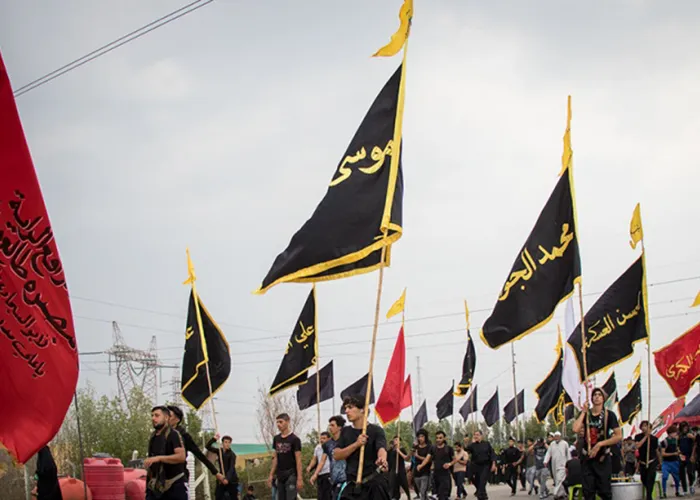religious-inquiries – Friday Bulletin Issue09
Grand Ayatollah Seyed Ali Khamenei
Permissible to Work or Engage in Business on the Day of Arbaeen
Q.1: Is it Permissible to Work or Engage in Business on the Day of Arbaeen?
A: It is permissible to go to work or engage in business on the Day of Arbaeen.
Q.2: If there is a reasonable possibility that the journey towards Karbala during Arbaeen will aggravate someone’s pain, is it permissible for him/her to travel for Ziarah?
A: It is impermissible to participate in the Arbaeen Pilgrimage if doing so poses a serious risk to one’s health.
Q.3: I am a college student in my final term of undergraduate studies, and I would like to travel to Karbala for Arbaeen. However, I’m certain that if I inform my father, he will not give me permission due to concerns about crowded roads and other reasons. Is it permissible for me to embark on the trip without informing my parents and only tell them once I’m already on my way?
A: If traveling without your parents’ knowledge would cause them distress, it is impermissible. Additionally, if your father forbids you from traveling for Arbaeen out of love and concern, you are obliged to obey him.
Q.4: Can a person who is in debt to relatives or friends participate in the Arbaeen Pilgrimage?
A: If the agreed-upon time for repayment has not yet arrived, or if the creditor has granted an extension, it is permissible for the debtor to participate in the Arbaeen Pilgrimage. However, if the repayment date has arrived and the creditor is demanding repayment, the debt must be settled before embarking on the pilgrimage. If a person undertakes a trip (whether for the Arbaeen Pilgrimage or any other reason) with the intention of avoiding repayment of a due debt or evading any other religious obligation, the trip is considered sinful, and their four-unit canonical prayers must be performed in full. If the trip is undertaken without such an intention, even if it indirectly results in avoiding a religious obligation, the journey is permissible, and the four-unit canonical prayers should be shortened to two units according to the general rule.
Grand Ayatollah Seyed Ali Sistani
Q1: Is it permissible to wail, cry loudly, and beat one’s head and face in mourning for Imam Hussain (as)?
A: Yes, there is no problem with this.
Q2: Is mourning for Imam Hussain (as) and other Infallibles (as) recommended?
A: Yes, it is recommended, and God will reward those who sincerely revive their memories and commemorate their martyrdom.
Q3: Is it permissible to jog (run at a steady pace) in mourning processions that take place in the streets to commemorate the martyrdom of Imam Hussain (as)?
A: There is no problem in it per se.
Q4: What is your opinion on men taking off their shirts while beating their chests in mourning processions? Is it permissible?
A: Yes, there is no problem with it.
Q5: What is the Islamic ruling on wearing all black during the months of Muharram and Safar? Is it recommended or considered abominable (makrooh)?
A: It is recommended to wear black, and the idea that it is abominable (makrooh) is not proven.
Q6: Is there any objection to people carrying chandeliers or flags at the front of mourning processions?
A: There is no objection to it.
Q7: What is the philosophy behind Azadari (mourning and lamentation) for Imam Hussain (as)?
A: The tragedy of Karbala, when attributed to the perpetrators, is undoubtedly a criminal and terrible act. However, when viewed from the perspective of Imam Hussain (as), it represents a conscious and courageous resistance for a sacred cause. The entire nation had failed to stand up to Yazid, and the deviation and regression towards pre-Islamic practices were increasing.
If Imam Hussain (as) had remained passive in this situation, it would have signalled the end of Islam as we know it. Thus, Imam Hussain (as) took upon himself the responsibility of the entire nation. The greatest tragedy is that the one who stood up for the noblest of causes—the defence of Islam—was brutally martyred.
It is for this reason that the sacrifice of Imam Hussain (as) is commemorated annually throughout the Muslim world. Our sorrow never fades as we relive the tragedy. The commemoration of Ashura on the 10th of Muharram each year serves as a reminder of the sacrifices made by the family of the Prophet (s). It also highlights the actions of those, both then and now, who tried to destroy Islam and the family of the Prophet (s), as well as those who stood by, watched, and did nothing.
Grand Ayatollah Naser Makarem Shirazi
Strengthening the Shia School of Thought through the Propagation of the Arbaeen Procession
It is clear that the ceremonies of Arbaeen held in commemoration of Imam al- Hussain (as) are much like a treasure of which more and more is discovered every single year. We must know how valuable this treasure really is, and we must tell the world about it as well. The whole world must know about this great gathering of Arbaeen and that it is a homage paid to the Ahl al-Bayt (as) by those who truly love them. This yearly gathering is of vital importance as it will help further establish and strengthen the Shia school of thought. The yearly processions of Arbaeen inject fresh blood into the Shia body worldwide and it is clear to the whole world that a gathering of such magnitude is something unique and without precedent. Such unique characteristics of the Arbaeen processions held in honour of Imam al-Hussain (as)will attract the attention of the people of the world and so they constitute one of the best ways to propagate the Shia school of thought, as well as the religion of Islam overall. From this perspective, the Arbaeen procession should be viewed as one of the strategic means through which Islam can be propagated.
editor's pick
news via inbox
Subscribe to the newsletter.




